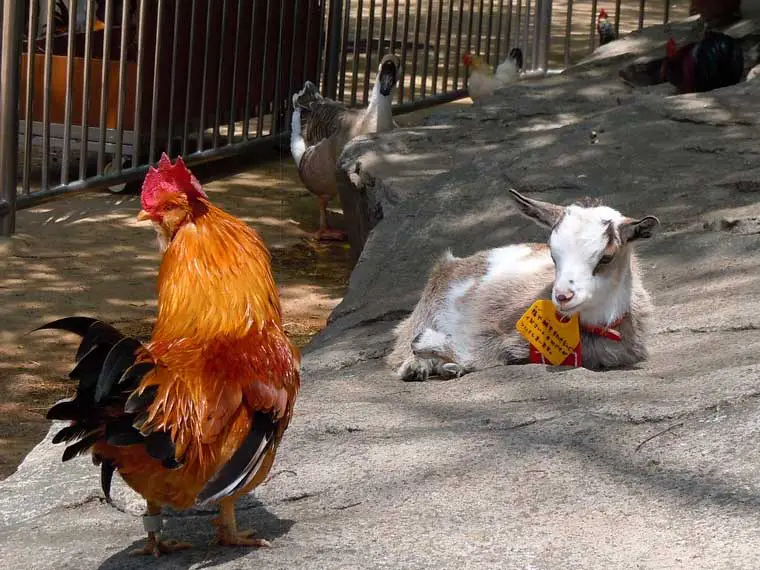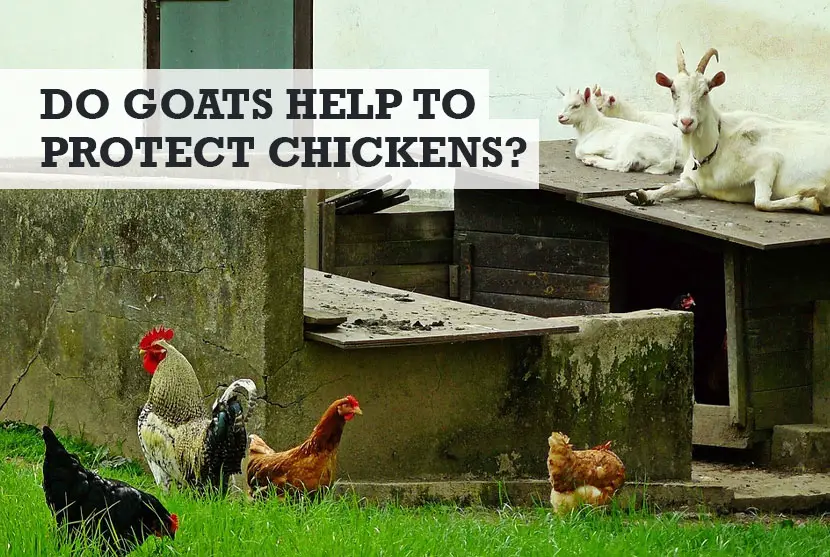As practical as chickens are, it can be hard work having to constantly keep them from falling victim to predators such as hawks. If your chickens are continuously dying or disappearing on the farm, you may be asking yourself how you can protect them.
You might have heard about the solution where it’s said that goats will protect chickens, but just how true is that. Here’s what you need to know…
Will a goat protect chickens? While the idea of a goat protecting a chicken is often said to be true, the reality is that goats will not protect chickens. There is no evidence to suggest that hawks will stay away from chickens when goats are nearby.
Will a goat protect chickens from hawks?
In most cases, a goat will not be able to protect your chickens from hawks or other predators. Goats fall victim to many of the same predators as chickens. Coyotes, foxes, bobcats, mountain lions, bears, and other predators hunt goats just as often as chickens.

While goats can’t protect chickens from land predators, goats might possibly deter predatory birds, like eagles, from snatching up your chickens. Larger animals mixed with small animals can help protect the small animals from flying predators.
What animals are predators to chickens?
To understand what it takes to protect your chicken, you’ll need to be aware of the kinds of animals that will attack your chickens. The following is a list of predators your chickens may come across:
- Dogs
- Coyotes
- Foxes
- Raccoons
- Bobcats
- Weasels
- Opossums
- Skunks
- Cats
- Hawks
- Eagles
- Owls
- Snakes
The best way to protect your chicken from predators is to secure them inside of a coop at night. Most chicken predators are nocturnal and therefore will hunt primarily at night, making the night the most dangerous for your chickens.
If you have the equipment, set up an outdoor night vision camera to help identify the predator will allow you to take the proper precautions in protecting your chickens. However, the answer for most chicken owners is simply assuring they are comfortable in their covered coops during night hours.
How to protect your chickens from predators
As mentioned previously, taking the proper precautions is dependent on the kind of predator you are dealing with. Here is a list of precautions that every chicken owner can take to prevent the loss of their chickens:
1. Bury the fencing around your chicken enclosure
A great way to add an extra layer of protection for your chickens is to bury the fencing around their enclosure into the ground. Concealing the fence around the enclosure blocks predators from prying the chicken fence up and invading the pen.
Be sure to bury the chicken’s fence at least 12 inches deep into the ground to prevent it from easily being dug or pulled up.
2. Add a roof to your chicken enclosure
The best way to protect your chickens from birds or predators that are willing to climb up the enclosure is to add a roof to their pen. You can achieve this by placing chicken wire over the chicken enclosure or a solid rooftop.
A solid rooftop, like metal or plywood, will also protect your chickens from weather conditions and prevent the chicken enclosure from getting wet or muddy.
Regardless of your choice for the roof, a roof, in general, will protect your chickens from predators.
If you choose a wire roof, be sure it is sturdy enough to support the weight of a predator. You wouldn’t want the predator to collapse on your chickens below!
3. Invest in a livestock guardian animal
Because goats don’t help protect your chickens, you’ll want to invest in livestock animals that can defend your chickens.
The best animals to protect chickens are said to be:
Most dog owners with chickens train their dogs to protect their chickens.
It is best to train and expose the chickens to your dog while still young for the best results. Otherwise, your dog may want to play with your chickens rather than protect them.
Donkeys and llamas aren’t known to play with chickens but are prey animals. However, they will attack any animal that comes through with bad intentions.
Geese protect chickens by hissing at and chasing anything they deem a threat and are another type of poultry, making it easy for them to merge with your chickens.
Handy Hint: If you’ve ever wondered why goats like to headbutt, then here’s your answer!
4. Create visibility around your chicken enclosure
Predators prefer the ability to hunt their prey. If the area surrounding your chicken enclosure is overgrown, you’ll inevitably have to ward off more predators because they like to sneak up on their victims before going for the kill. Try keeping the area around the enclosure visible with minimal foliage to keep predators at bay by not providing areas to hide.
Goats will not protect your chickens from predators
It is crucial to know that goats cannot protect your chickens from predators. They fall victim to the same animals, and goats will flee at anything they consider a potential threat.
If you’re looking for an animal to add to your farm that can ward off predators to protect your chickens consider getting a donkey, mule, or even a llama. These animals are more prone to fight off predators and less likely to run away, leaving your chickens helpless.
Goats will scare off birds that may try to take your chickens
Although goats can’t protect your chickens from land predators, they can ward off birds that may be trying to harm your chickens. Birds avoid hunting in areas where large animals live, so your goats will make them avoid the area.
Related questions
What is the best animal to protect free range chickens?
Livestock guardian dogs are probably the most popular and well-known animals to protect chickens. Dogs are intelligent, trainable, good companions, and quite frightening to many kinds of wildlife.
A few good livestock guardian dogs are Bernese Mountain Dogs, Australian Shepherds, Border Collies, Great Pyrenees, and German Shepherds.
Will goats keep hawks away from chickens?
A dog, donkey, alpaca, or another guard animal that mingles with your flock can help protect them from hawks. It is proven that merely keeping your chickens in an area with goats or horses can deter hawks because they see the larger forms below and move on.
What predator would bite just the head off a chicken?
Raccoons sometimes pull a bird’s head through the wires of an enclosure and then eat only the head, leaving much of the body behind. Also, raccoons may work together, with one scaring the chickens to the far end of a pen and the other picking off the birds’ heads.
Handy Hint: It’s interesting to know how goats and rats interact…
What animal will kill a chicken without eating it?
An animal that kills chickens without eating them could be a weasel. These predators love the thrill of hunting and killing, but it doesn’t mean they won’t eat chickens. Weasels usually attack an entire flock while killing every chicken but only eat one or two.
Will an owl go into my chicken coop?
Owls are intelligent birds, and they learn quickly from observing your poultry farm. Things like keeping night lights on at night can be a short-term deterrent. But if they can get away with a few chicks as spoils, they will do so every day up until you can secure the chicken coop.
Conclusion
If you have goats on your farm or are considering adding them, you may be asking yourself if putting goats with the chickens could protect them.
Whilst a goat on your property might discourage a hawk or bird of prey swooping in, it will never offer the full protect your herd needs.
You might also like…
- How goats and cats might be friends
- How many babies goats have might surprise you
- Will a goat in your yard keep snakes away?
Goat and chicken photo in the header via https://pixabay.com/photos/goats-chicken-animals-country-life-1601445/


